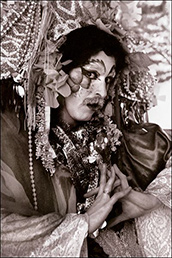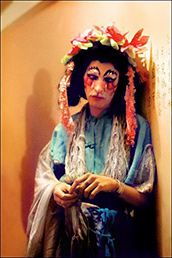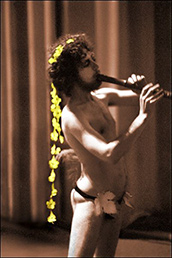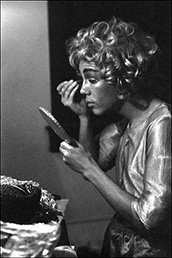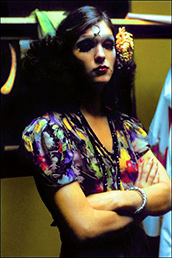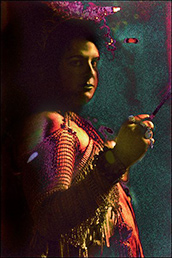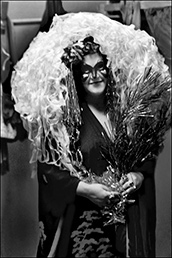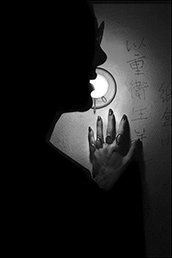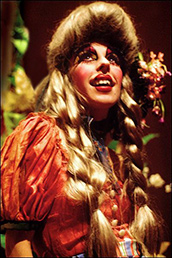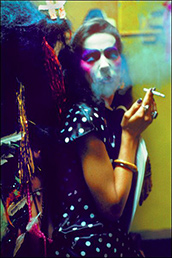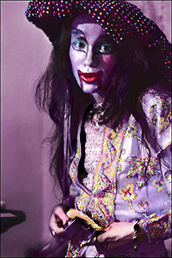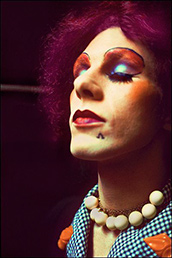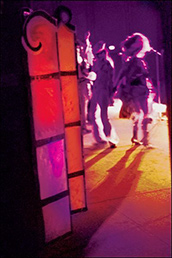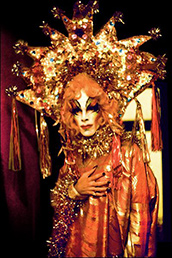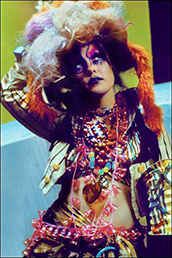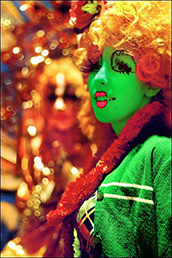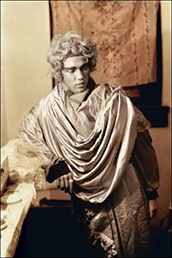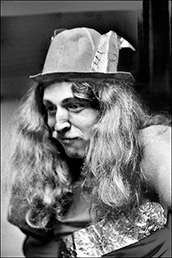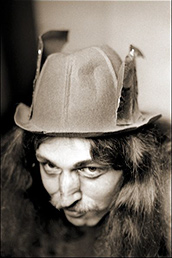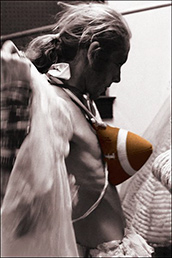|
|
|
|
|
|
|
|
|
|
||||||||||||||||||||
|
|
Return to the Photography Gallery | |||||||||||||||||||||||||||
MIDNIGHT & THE MUSICPhotographer Roger Arvid Anderson talking with musical director and composer SCRUMBLY KOLDEWYN on June 15, 2011 at the Hypnodrome in San Francisco When were you born? "Do you really want to know that? Was I born? I was conjured!" Whatever magic transpired, Richard Koldewyn, musician and composer, also known as Scrumbly of the legendary Cockettes, acknowledges that he dropped in on this world on October 10, 1945. His parents had a house in San Bernardino although the hospital where he was actually born was in Loma Linda. "Let's just say I'm from Southern California. But we moved around a lot; first to Ogden and then to Salt lake City in Utah, and then back to Southern California, about ten different houses." Were you born musical? "You could say that. Of course, everyone comes to music in different ways. In my case my parents were musical, which mostly had to do with the church. We were Mormons and the Church of Jesus Christ of Latter-Day Saints made for a lot of music. My mother was in the Mormon Tabernacle Choir when we lived in Salt Lake City. My dad also sang. My sister sang and was a really good pianist. She was ten years older than me, so I heard her playing all the time. I had some lessons initially when I was five, but I was playing before that, just messing around. By the time I was seven I was improvising a lot. I remember one time I was feeling some ghosts were in the house, so I improvised some ghost music. I composed my first song at fourteen, though I can't remember what it was. I was playing classical music as well. I also loved playing all the Christmas carols. I used to just open books and study them. I'm practically self-taught with Mozart and Bach that way." "At school I was in everything that was choral: first the boy's chorus in Junior High, that was in San Bernardino, and the choir and the chamber singers in high school, which was in Riverside. I think when I was a sophomore the band instructor wrote his own version of The Importance of Being Earnest, so I was involved with that. I was one of the actors and sang in the chorus. And then I was in The Mouse That Roared, but that didn't have any music. As a senior I was the father in Bye, Bye Birdie." Did you go to college? "Yes, I went to San Francisco State for awhile. I was in the music department studying composition, and I was also in the Chamber Singers there. That was 1964. Then I dropped out after awhile, returning to Riverside for a year. Moving back to San Francisco with my lover, I remember hauling my parent's old piano up here, and I used that before it kind of fell apart. James Joyce published a book of love poems called Chamber Music. Slowly but surely I was trying to set that to music. Since it was the Sixties I was singing folk music as well, so I actually gave the piano something of a rest because the guitar was a lot more portable. In 1969 I was even doing some blues and rock. Also at that time two friends of mine, Hip and Bloop from Alaska, decided I needed a nickname. When we all moved into a commune at California and Presidio, they introduced me as Scrumbly, then came the mini-fame of the Cockettes, and the name just stuck." When did you hook up with the Cockettes? "That's a long story, but from a musical point of view I joined up for their initial performance on New Years Eve. That would be December 31, 1969. We were the filler between the midnight movies at the Palace Theater in North Beach, not far from Fisherman's Wharf. We danced twice to a recording of the Rolling Stone's hit Honky Tonk Woman. After that the shows just got bigger and bigger. Let's see, the first show with live music was The Fairy Tale Extravaganza, or Gone With the Showboat to Oklahoma, or Hot Voodoo. I can't remember which. We needed a piano player so I plunked out the songs. And sometimes I was on stage. When we did June Is Bustin' Out All Over, I was on stage for that with my big plastic teats. Later, Peter Minton came along and took over playing the piano because he was vastly more experienced and talented. What an amazing pianist. He could listen to something just once and then sit down and play it. Also, he was very into the popular music of the Jazz Age, and that soon informed our style because suddenly we were all about Art Deco. Aside from traditional Broadway music, we looked to the Twenties and Thirties especially." What was your first show with an original book and score? "It was Pearls Over Shanghai, of course! I remember the clunky old piano we had on Haight Street. I was living with Link Martin at the time. I knew Link from several years before. He had an affair with my lover and then I had an affair with him. Shortly after that the Cockettes were formed. It was all sort of incestuous, but Link and I remained great friends, and there he was. He was a published poet. And he just sat down and wrote a musical, and he knew exactly what he was doing. And the lyrics were satirical, just fun. Since I didn't think it was going to be great art or anything like that, I just dashed off these little melodies. I didn't even write the melody out at the time. I just memorized it and put the chords in above the lyrics. So that's how we did it!"
Which came first, the music or the lyrics? "The lyrics came first. Always! Even when working with Martin." How did you meet Martin Worman? "I believe he was brought to a rehearsal in mid-1970. He wasn't a big performer to start with. Everybody who joined us, unless they had very obvious charisma or star talent, was relegated to the chorus for their first few productions. But then he could sing decently and at some point he became Sebastian in Pearls Over Shanghai. He sang the song Petrushka. Soon it came up in conversation that he also liked to write lyrics. When he showed up with one. I said, 'That's cute. Let's do it! So the following year, that's 1971, we put together a show called Circus of Life, which was actually the first show without Hibiscus. Link and Martin both contributed a couple of lyrics: both animal songs. Link wrote one called Paulette of the Poodles and Martin wrote one called The Camel Song. It was just expected that I'd write the melodies for them, which I did." Pearls Over Shanghai opened in November of 1970 and was revived two more times: in November of 1971 for their New York debut and again in May of 1972 when it was photographed by Roger Arvid Anderson. In December of 1971, shortly after the Cockettes returned from their infamous New York sojourn, Link and Martin once again both contributed songs to a New Year's Eve show called Les Etoile du Minuit (The Stars at Midnight). Any memorable moments? "Oh, yes! That had Gert's Postcard, which was a great Martin song. Also The Jewels of Paris, the big opening number, was done in a lavish Foiles Bergere style, and then Link wrote a song called Hot Cross Buns, which Link performed with Donnie Ward, both baring their buns, twitching their holes as they sang: Come eat me, eat me, eat me! In your mouth my journey starts. Down on your tongue I'm pleasing, Can you take me to your heart?" Who was directing these shows? "Anarchy was directing. Mister Anarchy! First of all I was doing most of the directing: 'Okay, let's focus!' or 'Let's believe in what we're doing!'" Music, sets, costumes: who sorted that all out? "We pretty much did all our own costumes, though I did a bunch of sewing for the other Cockettes, as did Nikki Nichols. The first lavish sets were by Nikki and Fayette, and especially John Flowers, with everyone pitching in if they had any talent for it. As for sorting it all out: we agreed by mutual agreement. Now John Rothermel, for instance, was a very key figure. He was Petrushka in Pearls. John didn't really do a lot of the decision-making. He preferred to remain above it all. I know Kreemah, Martin, Dusty, Miss Bobby, Goldie, John Flowers, Sweet Pam, other people, whoever spoke up had a say. So we had our meetings and more or less it was decided: so and so should do that. Yeah, I agree. No, I think that would be better for so and so. Okay. What about me? I want to do something. Well, how about we write this for you. So it's a mixture of anarchy and consensus, making sure everybody's happy: that is the key people have their songs and then making sure there's enough material so everybody has something to perform. Basically we were writing for the troupe."
Do I detect a sigh of exasperation? "Making everybody happy isn't always possible. In February of 1972 we put on Journey to the Center of Uranus. Not only did it have Divine, it had some more great songs by Martin: Divorcees' Lament and the Crab Song of course, and then we had this little number we had called The Kaliflower Hour, which had to be changed to The Rutabaga Hour because the Kaliflower community did not want any notoriety. And I said, 'Notoriety! How are you going to get famous?' But they didn't want any attention. They didn't want to be above ground. Nor did they want 1500 people a night hearing The Kaliflower Hour, because the buzz would start to go around about what it was about. All the dish!" Kaliflower was a weekly counter culture publication named for the flower that grew out of the ashes of Kaliyuga, the Hindu name for the last and most violent age of mankind. The Kaliflower Hour was a satiric twist on Kaliflower Day, which was every Thursday when the paper was distributed among the utopian communes in the Bay Area that believed in a society free from private property and all forms of buying and selling. They also believed in free theater and were critical of the Cockettes for charging a nominal admission fee. Over the years Scrumbly had lived in a number of San Francisco communes and understood the complicated politics of communal living. Which communes did you live in then? "I was in the one at Bush and Baker, when the Cockettes just got started. Haight and Divisadero was the main house after Pearls opened, and then a bunch of us moved into 1965 Oak where the people from Big Brother and the Holding Company had just lived before us. And that was Link, Sweet Pam, John Flowers and some others." When did you start to write the music down? "When we took Pearls and Tinsel Tarts to New York in November of 1971, that's when I had to write it out; mostly melody lines with the chords, little markings: go back to this, do this phrase twice. In the autumn of 1972, when we did our Halloween swansong Vice Palace, I may have written down a few melodies, but I really didn't start writing things down until the late Seventies, because by then I was working with more professional singers. It was just easier to have the references and we were certainly doing a lot of harmonies. I really started to get more formal about notation when I did a post-Cockette show with Martin called Rickets, A Day in the Life of the Counter Culture. It was about a department store." What is the trajectory of your musical career after the Cockettes? "In June of 1972 Pristine Condition, Sweet Pam, Pristine's lover Billy Orchid and I formed Pristine Condition with Paula Pucker and the Pioneers. It was a harmony group with Pristine as the lead singer and 'Paula Pucker and the Pioneers' as the backup. Paula Pucker was just another stage name for Pam. A lot of the time we also sang as a quartet; four-part harmony. When Vice Palace came along in October we did several numbers as one of the entertainments at the Villa Divina. Chris Flynn played the piano for us, and certainly played for the duet I sang with Divine called The Almighty Buck, with lyrics by Martin Worman. After the Cockettes finally broke up, 'PC with PP and the Pioneers' continued for a few years. We opened for the New York Dolls at The Stone, which was a rock club on Broadway, San Francisco's entertainment strip. We had this producer too, Peter Marino who put us on local cable TV. And then we started giving benefit concerts featuring numbers I had written with Martin, but some by Link, though Link was gone by this time."
What finally happened to Link? "After we went our separate ways at the end of 1972 Link went backpacking through Europe and Asia. China was opening up after Nixon's visit and that was his ultimate goal. After hitting London, Paris and Berlin he moved on to Turkey where he ran into Ford Wheeler who was the last of our circle to see him alive. Pam got a few letters. We heard he was in India, then Malaysia and Thailand, and then nothing until we got this mysterious news that he had died of a drug overdose in a hospital in Laos. None of it has ever been confirmed. His family eventually got a box with his personal effects. It was devastating. Gary Cherry checked out pretty early too." But the songs survive. "The songs survive. In fact, by 1975 we were already reaching back into the trunk. Then in 1978, with a new show called Night Shift, I put together a run at a nightclub called The City, just off of Broadway on Montgomery Street. We did a lot of original material plus numbers from the Cockettes era." Where were you in the 1980's? "Out of Night Shift grew another group called The Distractions. We didn't do a lot of original material, but I did start writing my own lyrics, as well as some collaborative lyrics like a fifteen-minute piece we called The Ballad of Sylvia Culver. It takes music from the Fifties to the end of the Sixties, then right into punk and down to the end of the Seventies. We did some a cappella new wave. And as far as I know, we were the first to do that sort of thing. My lyrics then were not as facile as Link's or Martin's. I think I am better at it now. I've had enough practice." How long did The Distractions last? "Not that long; about as long as the Cockettes did. We did have a long run at a club in North Beach. We got great reviews in the Chronicle: the little man jumping out of his chair! The tourists came, but we weren't making enough money. Even in 1980 thirty-five dollars a show is not that much money. But we did do a farewell concert and that was great. And then I went on and had another group, a quartet called The Questionnaires. We did conventional jazz, fairly intricate, but with a generous twist, so it was really fun. And then in 1984 came the Jesters. We were singing with the Royal Society Jazz Orchestra as a trio. So we'd sing the trios that were famous from the early Bing Crosby days when he was in the Rhythm Boys, who sang with Paul Whiteman. So we'd recreate those trios, transcribing them if they weren't furnished with the vintage band arrangements. And then we started writing our own material for the group and that took us right into the late Nineties after three tours of Europe. We also worked with the Peter Minton Orchestra. We were the exclusive vocalists for him. Peter has a concert every New Year's Eve at Davies Symphony Hall, and we still do that with him every year, but that's pretty much all we do now." When did you sense both you and the Cockettes were becoming historical? "I suppose it starts in 1994 with our 25-year reunion." The reunion was held in a storefront on Mission Street in San Francisco. For three days it was turned into an art gallery celebrating the Cockettes, with paintings by John Flowers and altars for Martin Worman, who had died of AIDS in 1993, and for John Rothermel who was in the last stages of AIDS. "Pristine Condition was pretty weak but still managed to sing." Prissy died later that year. In 1999 Rumi Missabu, the Cockette's archivist, hosted a 30-year reunion on Halloween night in his San Francisco flat at 53 Henry Street. Rumi decorated his rooms in the salon style with floor to ceiling Cockette memorabilia. In 2002 the documentary, The Cockettes, by filmmakers Bill Weber and David Weissman, debuted at the Sundance Film Festival and went on to a limited theatrical release. In 2004 Sweet Pam, also known as Pam Tent, published her autobiography under the title, Midnight at the Palace: My Life as a Fabulous Cockette. She gave her first public reading and slide show on December 2, 2004 at City Lights Bookshop on Columbus Avenue in San Francisco. Some of the original Cockettes such as Kreemah Ritz, Fayette, Scrumbly and Rumi were there as well as numerous fans including photographer Roger Arvid Anderson. Russell Blackwood, director of the Thrillpeddlers, read Pam's book in the autumn of 2007 and was inspired to meet her. On March 17, 2008, Russell threw a promotional event for the Cockettes at his intimate theater called the Hypnodrome, located at 10th and Bryant Street in San Francisco's South of Market area (SOMA). His ensemble of actors is known for Grand Guignol horror plays as well as the Theater of the Ridiculous. He billed the evening's gathering as Fayette and Rumi are Pouring the Wild Turkey on Saint Paddy's. Russell's guests also included Sweet Pam, Harlow and Tahara. The event featured some performances and a question and answer talkback with the audience. In June of 2008 Robert Croonquist, Martin Worman's partner, and now the manager of his estate, invited all the surviving Cockettes to come to New York for a symposium called Calling All Cockettes, which he sponsored at the Gay Center in the Village. You were there? "We all went at his expense, which was wonderful, and we had a great party. While we were there Fayette was doing some networking, and some people she came across said, why don't you do a show?" Those people proved to be the producers of the HOWL! Festival. Russell Blackwood, who had also attended the symposium, was invited to bring a workshop production of Pearls Over Shanghai to the festival with Rumi and Fayette reprising their original roles as Madam Gin Sling and Lotty Wu. A revival was now more than talk.
What happened? "Okay, we get back, and we pull together a shortened version of Pearls with the Thrillpeddlers. I didn't go to New York, but I recorded a CD of the piano accompaniments for them to sing to." The abridged version was performed in September of 2008 as part of the HOWL! Festival at the 45 Bleecker Street Theater. "When those that did go came back, they all said let's do a show full out." On June 5, 2009 Pearls Over Shanghai opened at the Hypnodrome, and played to packed houses for nearly two years, before closing in April of 2011. Did you make many changes? "We filled it out a little more, added another song, then a verse here and there, made it a little more mature like a full-grown musical." Original Cockettes, Billy Bowers and Tahara came on board to help with costumes. Rumi once again played Madam Gin Sling, Empress of Vice. Scrumbly added a role for himself in Comintern drag as Ilsa, a German Communist Lesbian living in Shanghai, who introduces the evening's proceedings as not very P.C. (politically correct), before turning to play the piano. How would you describe your role in the Thrillpeddler's production? "It was a dual role: I was the musical director and I was the Cockette consultant. I'd give Russell a running commentary: the Cockettes would do it this way, or that's more Cockette-like!" On December 3, 2009 the San Francisco Museum of Modern Art celebrated The Cockettes on Film, at 40! Evening screenings of Tricia's Wedding and Elevator Girls in Bondage were held in their Wattis Theater, followed by a party with music held by the Tingel Tangel Club at the Café du Nord on Market Street. The host was Justin Bond who introduced special appearances in costume by Rumi, and Scrumbly, and other members of the Thrillpeddler's cast of Pearls Over Shanghai. In the summer of 2010 Hot Greeks was also revived by the Thrillpeddlers, but as a one act. The book and lyrics were written by Martin Worman in March of 1972 as a way to pay homage to his alma mater, Rutgers. Scrumbly wrote the musical score and in the original production played the quarterback Pendulum Pulaski. He wore broad shoulder-pads and sported a huge foam rubber phallus. He also had a cap feathered with two aluminum foil wings that recalled the helmet of Mercury, the swift Messenger of the Gods. The show was ostensibly Aristophanes' comedy Lysistrata married to late Thirties college musicals. In the revival Scrumbly added a few tart verses of his own to Martin's wry yet touching lament titled The Boys of the Chorus, three of whom came onstage each capped by sculptural reductions of the Corinthian, Ionic, and Doric capitols that traditionally crown the pillars in ancient Greek temples.
Were the boys an immediate hit? "The revival version brought the house down. Unfortunately the original 'Boys' didn't come off nearly so well. I can see that now, but as a young Cockette my personal theater experience up to that time was very limited. I had never seen a real Broadway show, only touring productions, local civic light opera and amateur productions, and what we did in high school. But since then I've gained immense experience either directing or performing in community theater productions of Broadway musicals. I've also seen all kinds of theater in New York plus years and years of touring productions. I'm involved too in teaching musical theater to kids. I now know how it's done." What differences come to mind? "When we revived Hot Greeks as a one act, we had a second act, which was a show and tell review we called The Best of the Cockettes. Take for instance the song, Paulette of the Poodles: Goldie was the original Paulette. Well, Goldie is one of a kind. Goldie couldn't sing really, but made up for it with great stage presence. All in all with the Thrillpeddlers there's just more talent involved, not necessarily more charisma, just more polish. Keep in mind, the Hynodrome is only 46 seats, the Palace had 1200 seats. Two very different reactions: one more cabaret and the other more cavernous. At the Palace you couldn't help but feel that rush of energy from the audience and you'd just naturally rise to match it. Remember it's midnight and the crowd is as high as a kite. Sometimes the audience would just go crazy and stomp their feet to such a degree the whole theater would shake like thunder. I often thought the balcony was going to fall down." What does that sound like? "Oh anarchy, that old thing! Well, there's always a bit of anarchy when it comes to putting on a musical. There's usually a production team and although one person has to ultimately call the shots, there's usually a lot of commiseration and collaboration involved. So you might say that's a form of anarchy. I mean it's just too clumsy without any real leadership, and that's the reason the Cockettes didn't last for that long. If you can't really focus that well, you can't really get that much done, but that is not what the Cockettes were about. It was never our intention to create an institution. We were out to explode the whole idea of theater and gender identity and all that... And let it fall however it may... Let the chips fall..." |
||||||||||||||||||||||||||||
Images and Text © 2012 Roger Arvid Anderson, All Rights Reserved |
||||||||||||||||||||||||||||
